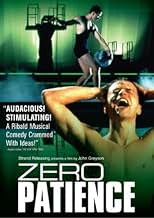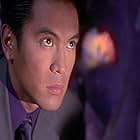An immortal, bigoted, unethical taxidermist is doing research on "Patient Zero", the gay flight attendant who allegedly was the first to bring AIDS to North America, for a museum show about ... Read allAn immortal, bigoted, unethical taxidermist is doing research on "Patient Zero", the gay flight attendant who allegedly was the first to bring AIDS to North America, for a museum show about contagious diseases, helped by the man's ghost.An immortal, bigoted, unethical taxidermist is doing research on "Patient Zero", the gay flight attendant who allegedly was the first to bring AIDS to North America, for a museum show about contagious diseases, helped by the man's ghost.
- Awards
- 3 wins & 1 nomination
Photos
Ann Medina
- Narrator
- (voice)
Benedict Campbell
- Newscaster
- (voice)
- Director
- Writer
- All cast & crew
- Production, box office & more at IMDbPro
Storyline
Did you know
- Trivia[Foreword] In 1987, newspapers around the world accused a Canadian flight attendant of bringing AIDS to North America. They called him "Patient Zero".
- ConnectionsFeatured in Shock Video 3: Turn-On TV (1996)
- SoundtracksJust Like Scheherazade
Vocals by Normand Fauteux
Featured review
Film Critic DELIVERED with stinging irony, that lyric is meant as a blanket indictment of empiricism, and of our abiding need to "classify and label," to "banish every doubt." Why? Because a label is a tool that can double as a weapon - what identifies and separates can also isolate and stigmatize. How, then, to describe Zero Patience without falling into the empiricist's, and the critic's, taxonomical traps? A "movie musical about AIDS" is a popular answer - one that's odd enough to be enticing, vague enough to be innocuous. But it doesn't begin to sound the depths of a work that is intriguing, provoking, amusing, offending, demanding, inordinately intelligent, and defiantly resistant of the very thing I'm paid to do.
So let's approach the picture from another angle, from the perspective of writer/director John Greyson. Now Greyson, unlike some artists who happen to be gay, would probably agree that there is indeed a definable "gay culture," an esthetic that goes heavy on irony and camp and outrageous humour and unapologetic theatricality. Clearly, all these ingredients are abundantly evident here. Just as clearly, Greyson (whose background lies in - get ready for a label - experimental video) has positioned his film at a 180-degree remove from a piece like Philadelphia. That movie, a drama about AIDS with a gay protagonist, was the product of mainstream Hollywood culture (unironic, non-outrageous, linear in plot and design), and took enormous pains not to offend a mainstream audience. This one is the product of a gay culture and doesn't give a damn who it offends. This one is smarter and more subtle, but lacks the emotional punch of the other (linear directness has its rewards), and the attendant complexities are hard to grasp at a single sitting.
Perhaps this will help a little: Greyson has reincarnated the Victorian explorer Richard Burton (John Robinson), using him to symbolize the dangers inherent in the empirical approach still taken by the scientific community toward all issues, including the AIDS plague. Burton, who toils in a Natural History Museum, is intent on mounting an exhibit called The Hall of Contagion, with AIDS as the sexy centrepiece. Just as his explorer colleagues once tracked the source of the Nile, he hopes to trace the "cause" of this disease. Causation, of course, is a first principle among empiricists. Rationally, if you find the cause, you may find the solution. Ethically, alas, it's a different matter; there, if you find the cause, you can point the finger - you can affix blame, you can isolate and stigmatize.
Enter another reincarnated soul, a gay ghost known as Patient Zero (Normand Fauteux) - the flight attendant who, in books like Randy Shilts' And The Band Played On, is "blamed" for first bringing AIDS to North America. Much of the film unfolds as an ongoing dialectic between the attitudes embodied in Burton and Zero, between serving a false cause and serving as a false villain. However, the dialectic takes the form of a literal song and dance - zippy production numbers where Glenn Schellenberg's toe-tapping melodies are laid over Greyson's thought- provoking lyrics. Consequently, the decorative fun on the surface (watch, if you dare, for an eye-popping ditty entitled The Butthole Duet) simultaneously competes with and complements the seriousness beneath - it's like tossing a colourful AIDS quilt over a dying AIDS patient. Greyson has refined and desentimentalized that most difficult of genres, the musical tragedy, and with every succeeding tune, he exponentially advances his thesis - other potentially false causes, like the "African Green Monkey" theory, like the HIV virus itself, come under his fire, as does everything from greedy drug companies to grousing AIDS activists. The film spares no one because, well, the disease spares no one.
Philadelphia is American in origin, Zero Patience is Canadian. Each is splendid in its own way, and each reflects the best of the culture (and the industry) that gave rise to it. The former is conventional, straightforward, and all about certainty, including the certainty of death. The latter is quirky, complicated, and all about uncertainty, especially the uncertainty of life. Greyson, and the film he's made, are brave enough to question incessantly, and smart enough to know that "HIV- positive" is a lot more than a medical label - it's a cruel oxymoron. He has zero patience for the blustering apostles of science and even art, and (the ironies abound) has more in common with another eminent Victorian than he might care to admit. Mister Greyson, meet Mister Tennyson: "There lives more faith in honest doubt,/ Believe me, than in half the creeds." Benjamin Miller, Filmbay Editor.
So let's approach the picture from another angle, from the perspective of writer/director John Greyson. Now Greyson, unlike some artists who happen to be gay, would probably agree that there is indeed a definable "gay culture," an esthetic that goes heavy on irony and camp and outrageous humour and unapologetic theatricality. Clearly, all these ingredients are abundantly evident here. Just as clearly, Greyson (whose background lies in - get ready for a label - experimental video) has positioned his film at a 180-degree remove from a piece like Philadelphia. That movie, a drama about AIDS with a gay protagonist, was the product of mainstream Hollywood culture (unironic, non-outrageous, linear in plot and design), and took enormous pains not to offend a mainstream audience. This one is the product of a gay culture and doesn't give a damn who it offends. This one is smarter and more subtle, but lacks the emotional punch of the other (linear directness has its rewards), and the attendant complexities are hard to grasp at a single sitting.
Perhaps this will help a little: Greyson has reincarnated the Victorian explorer Richard Burton (John Robinson), using him to symbolize the dangers inherent in the empirical approach still taken by the scientific community toward all issues, including the AIDS plague. Burton, who toils in a Natural History Museum, is intent on mounting an exhibit called The Hall of Contagion, with AIDS as the sexy centrepiece. Just as his explorer colleagues once tracked the source of the Nile, he hopes to trace the "cause" of this disease. Causation, of course, is a first principle among empiricists. Rationally, if you find the cause, you may find the solution. Ethically, alas, it's a different matter; there, if you find the cause, you can point the finger - you can affix blame, you can isolate and stigmatize.
Enter another reincarnated soul, a gay ghost known as Patient Zero (Normand Fauteux) - the flight attendant who, in books like Randy Shilts' And The Band Played On, is "blamed" for first bringing AIDS to North America. Much of the film unfolds as an ongoing dialectic between the attitudes embodied in Burton and Zero, between serving a false cause and serving as a false villain. However, the dialectic takes the form of a literal song and dance - zippy production numbers where Glenn Schellenberg's toe-tapping melodies are laid over Greyson's thought- provoking lyrics. Consequently, the decorative fun on the surface (watch, if you dare, for an eye-popping ditty entitled The Butthole Duet) simultaneously competes with and complements the seriousness beneath - it's like tossing a colourful AIDS quilt over a dying AIDS patient. Greyson has refined and desentimentalized that most difficult of genres, the musical tragedy, and with every succeeding tune, he exponentially advances his thesis - other potentially false causes, like the "African Green Monkey" theory, like the HIV virus itself, come under his fire, as does everything from greedy drug companies to grousing AIDS activists. The film spares no one because, well, the disease spares no one.
Philadelphia is American in origin, Zero Patience is Canadian. Each is splendid in its own way, and each reflects the best of the culture (and the industry) that gave rise to it. The former is conventional, straightforward, and all about certainty, including the certainty of death. The latter is quirky, complicated, and all about uncertainty, especially the uncertainty of life. Greyson, and the film he's made, are brave enough to question incessantly, and smart enough to know that "HIV- positive" is a lot more than a medical label - it's a cruel oxymoron. He has zero patience for the blustering apostles of science and even art, and (the ironies abound) has more in common with another eminent Victorian than he might care to admit. Mister Greyson, meet Mister Tennyson: "There lives more faith in honest doubt,/ Believe me, than in half the creeds." Benjamin Miller, Filmbay Editor.
- How long is Zero Patience?Powered by Alexa
Details
- Release date
- Countries of origin
- Languages
- Also known as
- Paciente cero
- Filming locations
- Wallace Studios, Ontario, Canada(production studio)
- Production companies
- See more company credits at IMDbPro
Box office
- Gross US & Canada
- $217,300
- Gross worldwide
- $217,300
- Runtime1 hour 41 minutes
- Sound mix
- Aspect ratio
- 1.85 : 1
Contribute to this page
Suggest an edit or add missing content











